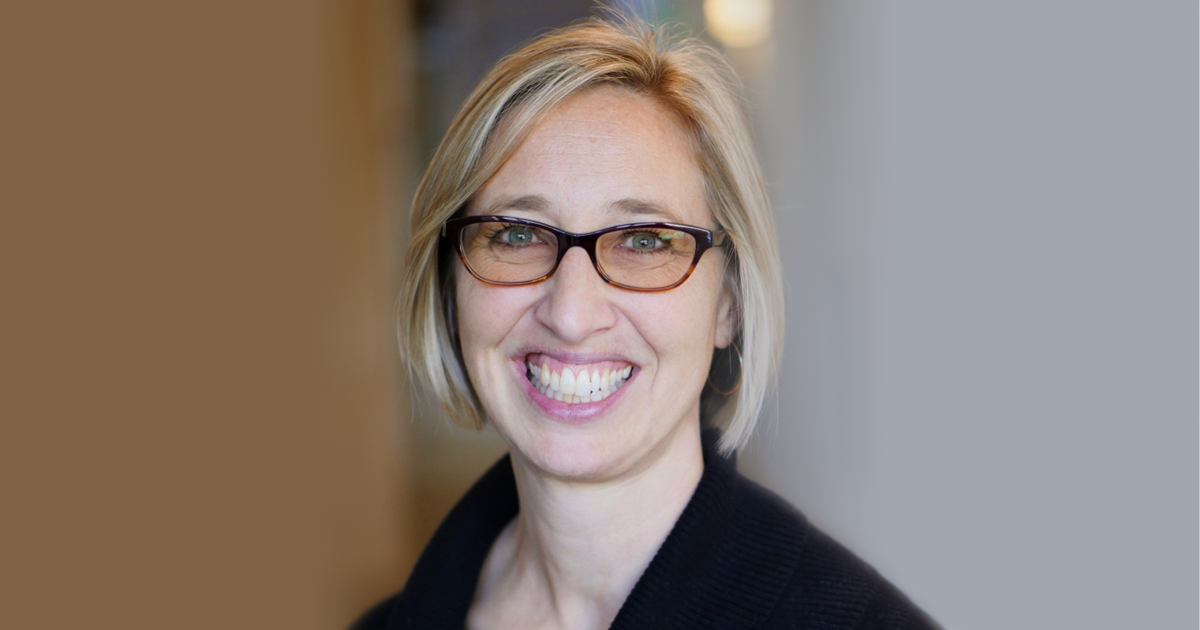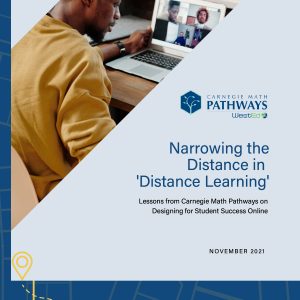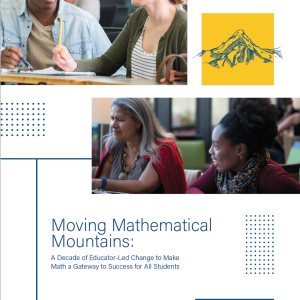A Decade of Impact on Math Learning and Teaching: Q&A with Karon Klipple
Posted on

To celebrate a decade of Carnegie Math Pathways reshaping entry-level math education and transforming the postsecondary education journey of students across the nation, we feature a Q&A with Karon Klipple, Executive Director of Carnegie Math Pathways. In this Q&A, she reflects on the program’s impact and innovation, how institutions can rethink math learning and teaching, and her vision for Carnegie Math Pathways’ future and the future of math education.
“A 2010 study published by the Community College Research Center (CCRC) put in stark relief the widespread inequities and profoundly negative effects of the remedial math system in higher education, something long known firsthand by instructors. At the time of the study, over 500,000 students annually were failing developmental mathematics, preventing them from achieving their college and career goals. This system was particularly disadvantageous to Black, Latinx, Indigenous, first-generation students, and students experiencing poverty.” — Moving Mathematical Mountains (p. 3)
How has the first decade of Carnegie Math Pathways (CMP) impacted math education in the U.S. and made learning more equitable?
In the last decade, we’ve made tremendous strides in creating more equitable paths in math education. First, we created math pathways aligned with students’ interests and careers. No longer must all students traverse a one-size-fits-all track to calculus. Now students can learn mathematics, such as statistics and quantitative reasoning, that is inherently relevant to their lives and future careers.
Second, we’ve demonstrated that with the right supports, students can successfully enroll directly in college-level mathematics and avoid the long and costly sequences of developmental math. These innovations—differentiated math pathways and a corequisite approach to remediation—are now the norm in roughly half the states around the country. And the results are profound. Year after year, students in Carnegie Math Pathways courses successfully earn college math credit at triple the rate of their peers in more traditional courses and in half the time.
What are the benefits of supporting the “whole learner” in mathematics, and how does the CMP curriculum attend to student needs?
This is a critically important part of mathematics education and one which we’ve shown significantly affects student success. By attending to the whole learner, we mean supporting students’ social-emotional growth and equipping them with strategies that enable them to persist productively through challenges. This critical work builds students’ confidence in their ability to do mathematics, their confidence in the classroom, their sense of the value of mathematics, and ultimately their success.
We can change students’ perception of mathematics and their conception of themselves as math learners by cultivating a community and sense of belonging in the math classroom and ensuring that the mathematics students engage with is authentically meaningful. As a result, students are more successful in mathematics and more prepared to tackle their future courses with the confidence and growth mindset that will strengthen their success.
Faculty play a central role in developing the Pathways Quantway and Statway curricula and instructional resources. How does this development differ from the traditional approach to college-math learning?
Faculty have been essential to the design and development of Carnegie Math Pathways. Drawing from their experience in the classroom, we were able to create a holistic approach to math teaching and learning that more effectively supports student success.
Too often, students encounter learning environments that are not only counterproductive but downright harmful. Traditionally, math instruction has focused on procedural fluency, often valuing computational speed rather than conceptual understanding and connections to real life. In a traditional math class, instructors demonstrate a process and students reproduce it. We know from research that this approach to instruction leaves students with a shallow understanding of mathematical concepts and without the ability to transfer their knowledge to new situations.
The Carnegie Math Pathways courses Statway and Quantway were developed according to research-based design principles that build students’ conceptual understanding while ensuring procedural fluency.
The Pathways design principles are/include:
- Mathematics learning is centered in applied contexts that are authentically relevant to students
- Students engage actively and collaboratively in their learning
- The learning environment is welcoming and inclusive, building students’ confidence and self-efficacy as learners
- Students have the opportunity to build and strengthen their language and literacy skills through mathematics
- Faculty are well supported to implement this approach through comprehensive and quality professional learning opportunities
Faculty also play a central role in professional learning to support new educators. Pathways faculty mentors provide robust training to faculty and offer ongoing one-on-one support throughout the first year. This creates a powerful and supportive space for educators to try and build skills with a new, evidence-based approach. Many faculty that we work with share that this professional learning experience has made their classroom teaching much more rewarding.
What are your recommendations for institutions that want to critically rethink their entry-level and foundational math offerings and support learning recovery?
Start by considering what math your students need to learn. Right now, are most of your students on the same path to calculus regardless of their interests or goals? Find out what the specific math requirements are for each of the programs of study you serve. You will likely find that a quantitative reasoning or statistics class would better serve many students than college algebra. Creating these alternative math pathways will help students see the relevance of what they are learning and keep more students on the path to college success.
Examine your math course sequences. How many levels of developmental math does your institution offer? How many students must complete two or three or even four developmental math classes before they can enroll in their first college-level math class? National studies have shown that with the right corequisite supports, students can successfully enroll directly in college-level mathematics. Carnegie Math Pathways recently partnered with Dana Center and Strong Start to Finish to create the Corequisite Mathematics Toolkit, which offers guidance on designing and implementing corequisites for scale with equity in mind.
Support faculty in quality instruction. The structure of math pathways and corequisites, including the learning environment, play a critical role in student success. How are math faculty at your institution supported in terms of professional development, peer learning, and access to quality curriculum materials? The Carnegie Math Pathways offers in-depth professional training and one-on-one mentorship to new Pathways instructors centered on research-based curriculum—designed to help faculty create learning environments that build confident and capable learners. To explore our full sample curriculum and learn about more of the resources we offer educators, sign up to access our Explorer site.
Over the last decade, Carnegie Math Pathways has driven the creation and continuous improvement of innovative course solutions and instructional resources. What’s your vision for the program in the next 10 years and the future of math education?
Our goal in launching the Carnegie Math Pathways was to demonstrate that a more equitable and impactful approach to math education was possible. Since then, we’ve worked with hundreds of colleges and universities that have used Carnegie Math Pathways to restructure their entry-level math programs and change their approach to instruction. Doing so has helped tens of thousands of students avoid the remediation cycle and advance toward their education and career goals.
Now we’re working with an increasing number of high schools to ensure students are ready for college math when they get there. Through high school readiness programs and K–12 and college dual enrollment partnerships, we are making math learning opportunities more equitable, increasing student success in high school, and ensuring more students advance to higher education college-ready.
We believe that all students are capable of success in mathematics and that math should be a gateway, not a gatekeeper, to their dreams and aspirations.
Learn more about Carnegie Math Pathways’ impact over the last decade in their new report: Moving Mathematical Mountains: A Decade of Educator-Led Change to Make Math a Gateway to Success for All Students.


